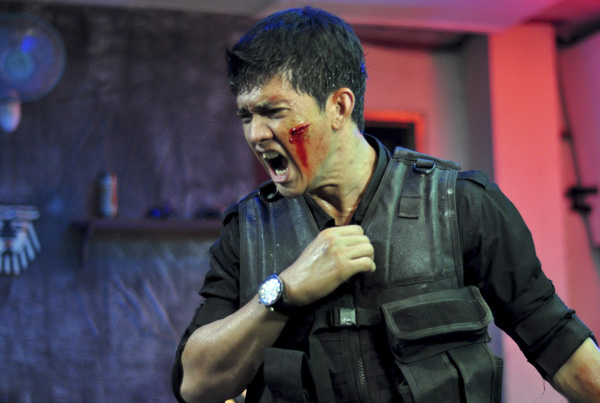
Star Ido Uwais as Rama (Akhirwan Nurhaidir/Sony Pictures Classics)
The stupefying, pulpy excess of Gareth Huw Evans’s much-buzzed-about new film is best summed up by fact that the credits include the role “Drug Lab Guard #21.” And yes, each of those hapless employees is dispatched individually, with lavish care, in a way that perfectly reflects the overall aesthetic of The Raid: Redemption—superbly controlled mayhem. Think Jean-Pierre Melville armed with a meat cleaver.
But it’s that same sense of over-generosity, of a cup overflowing and then even more being poured into it, that makes it easy to lose sight of the film’s many less obvious virtues. Let’s start with editing that is cool and precise amidst the bloodiness, kind of like a very good field surgeon. The result is that the movie clicks along as if on a mission itself, mimicking the Indonesian SWAT troops at its center that attempt to take down a bad guy, who’s more “warlord” than “crime lord.” The difference is that, unlike the cops, the filmmakers never get in over the heads. The camera operator seems to be mere inches away from every leg sweep and knife slash, but not for a moment do you feel that what’s on the screen is chaotic—instead, it’s a stunning mix of immediacy and clarity. In fact, for those who look down their noses at martial arts films, I offer this brand of reverse snobbery: if you don’t get the amount of craft at every stage of production that goes into something like The Raid, then you don’t really get the process of filmmaking.
Evans’s previous film with star Iko Uwais, Merantau (2009), also featured some stunning action, but the slightly hokey, save-the-girl plot was something you endured in order to enjoy each set piece. Here Evans-the-writer has wisely stripped things down to their basics, sketching in just enough backstory for the hero so that he doesn’t come across as a two-dimensional fighting machine. After briefly being introduced to him, we cut to the inside of a police van, and soon we’re off to the races. Well, okay, maybe not right away. First we get some exposition, the type that makes you wonder why the guys, who are about to risk their lives, weren’t told all this in some briefing room earlier. It’s a little goofy, but you overlook it because, before you know it, the van pulls up near the tower block, and then the assault proper begins.
With its elongated corridors, sharp corners, and doors that open unexpectedly onto danger, the setting has a very videogame-ish feel. Yet oddly the picture never comes across as claustrophobic or if it’s cutting budgetary corners. So while there may be some debate as to whether The Raid is the greatest action movie ever, there can be little doubt that it’s the greatest one set primarily indoors. No orange blossom explosions with some tough guy walking toward the camera, no car chases, no ostentatious aerial shots. Instead, we simply have a boiling pot with the lid kept securely on. As in the posthumously released Bruce Lee film The Game of Death (1978), there’s a different threat on every level of the structure, and the good guys must fight their way through all these tiers, sometimes backtracking as necessary, until they get to the big boss man. That’s it.
Okay, so maybe I’m oversimplifying since, after all, there are a couple of subplots. Still, these are minimalist in their own way and, although they throw the plot for a few slow curves, they never sidetrack the forward momentum or dilute the intensity. Similarly, the multiple sequences of quiet suspense never come across as mere breaks in the action, as opportunities to catch your breath so you can stay on the curve of exhilaration rather than pass out from exhaustion. To be sure, they function that way structurally, but they are usually deeply satisfying in their own right as well, often constructed as mini-dramas with their own beginnings, middles, and ends. Indeed, one scene involving a blade thrust blindly through drywall already registers as a classic upon a first viewing.
Speaking of blades, one of my favorite details concerns a knife gently scraping against the underside of a table as it’s slowly drawn from its sheath—never has this gesture held such delicious timbre. If that sounds fiendish, then so be it, because The Raid: Redemption is full of moments that you relish in this way. Indeed, as the villain reminds his minions at the commencement of battle, “…and please, enjoy yourself.” It’s a line that’s almost bound to get a smile from the audience because its self-assured tone echoes the film’s own. It dares you to demand more because, in the end, it has no doubt that it can deliver.
















Great film. Can you however explain the reduced level of noise at about 30mins 9 secs. It is where guns are being shot from a downstairs room into a cops body hanging down through a hole. It lasts for about 20 secs or so. Is it a fault of this part of the film, or is it to convey a slight deafening in the cops hearing? I will give it 9 out of 10 otherwise.